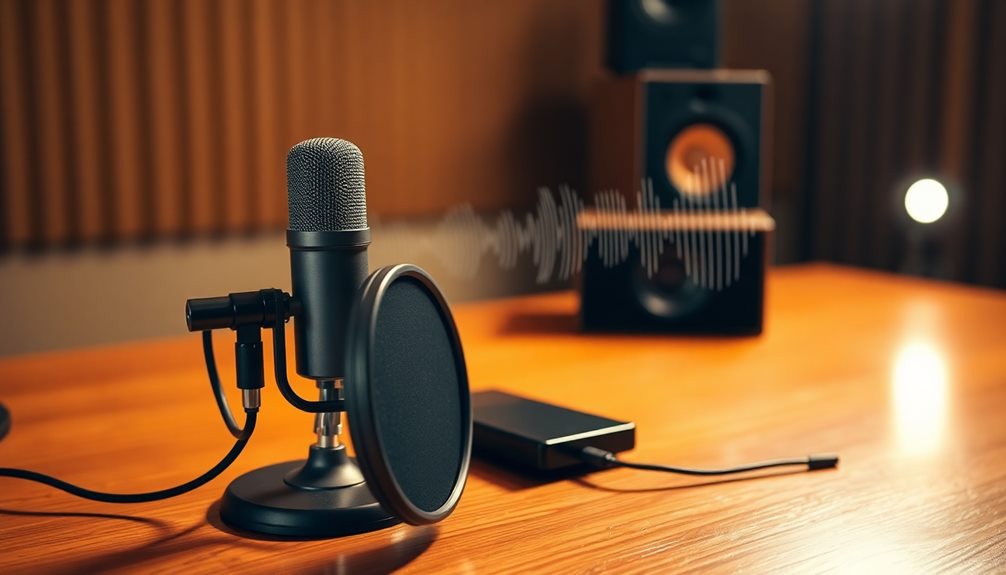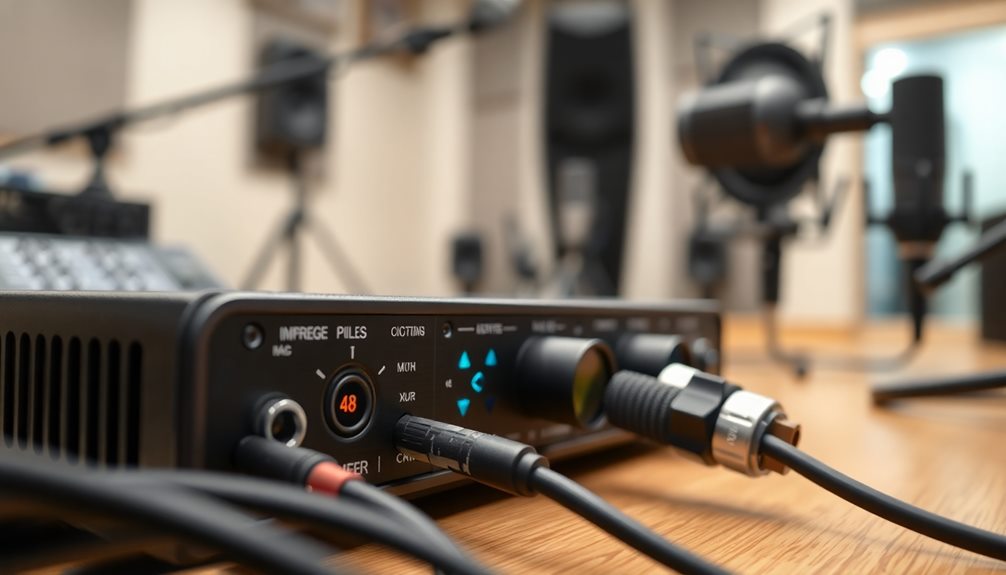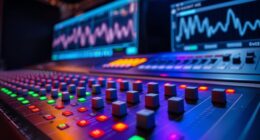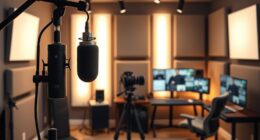A cardioid microphone is the best choice for vocal recording! It picks up sound from the front, ensuring your voice shines, while blocking out background noise from the sides and back. This makes your vocals clear and professional, perfect for singing, podcasting, or even speeches. With models like the Shure SM58 or Audio-Technica AT2020, you'll get great sound, whether you're in a studio or performing live. Plus, these mics handle high volumes without distortion. Trust me, using a cardioid mic will make your recordings sound amazing and full of life! There's so much more you'll want to discover!
Key Takeaways
- Cardioid microphones capture sound primarily from the front, enhancing vocal clarity while rejecting noise from the sides and rear.
- They are ideal for solo performances, isolating vocals and minimizing background noise for professional-sounding recordings.
- Popular models like Shure SM7B and Audio-Technica AT2020 offer excellent sound quality for both studio and live settings.
- Cardioid microphones handle high sound pressure levels without distortion, making them suitable for various vocal applications.
- Their frequency response ranges from 20Hz to 20kHz, effectively capturing the full vocal range for impactful recordings.
Understanding Microphone Polar Patterns
When it comes to choosing the right microphone for vocal recording, understanding microphone polar patterns is essential. One of the most popular types is the cardioid microphone. This mic has a heart-shaped polar pattern that picks up sound from the front while rejecting background noise from the sides and rear. This feature makes it perfect for vocal recordings, especially in noisy environments.
When you sing or speak into a cardioid mic, it captures your voice clearly. This enhances vocal clarity, so every note and word stands out. Plus, cardioid microphones typically have a frequency response range of 20Hz to 20kHz, which means they can capture the full range of human vocal frequencies.
In live performance settings, these mics shine. They minimize feedback from speakers behind them, allowing you to perform without worry. Popular models like the Shure SM58 and Audio-Technica AT2020 utilize this design, focusing on your voice while reducing unwanted ambient noise.
This makes your sound crisp and clear, even in a crowded space. So, if you're serious about your vocal recordings, understanding polar patterns will help you make the best choice!
Benefits of Cardioid Microphones
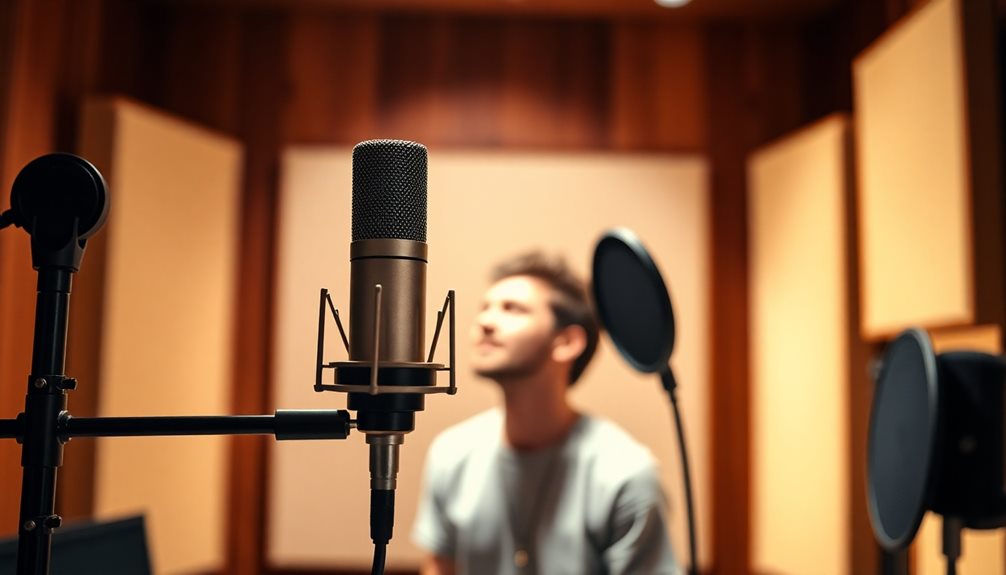
Cardioid microphones are fantastic for capturing your voice while blocking out unwanted sounds!
Their special design helps you sound clear and bright, which is super important for recording vocals.
With less background noise, you can really shine in your performances, whether you're in a studio or on stage!
Noise Reduction Capabilities
The heart-shaped polar pattern of cardioid microphones makes them exceptional tools for noise reduction during vocal recordings. When you use a cardioid mic, like the Shure SM7B, you'll notice how well it captures your voice while blocking out unwanted sounds. This design helps you focus on what really matters—your vocals!
Here are some benefits of using cardioid microphones for noise reduction:
- They pick up sound mostly from the front, reducing background noise.
- They're perfect for live performances by minimizing feedback.
- Their sensitivity allows handling high sound pressure levels without distortion.
- They help isolate your voice, creating a clean recording.
With these features, cardioid microphones help you achieve vocal clarity and make your recordings shine.
Whether you're recording vocals in a studio or performing live, you can trust these mics to deliver. You'll enjoy the clean recordings they provide, making post-production easier and more enjoyable.
Vocal Clarity Enhancement
Experience the difference a cardioid microphone can make in enhancing vocal clarity. When you use a cardioid mic, you'll notice how it focuses on your voice while reducing background noise. This heart-shaped polar pattern means it picks up sound directly in front, making your vocals shine in the mix.
Whether you're in a recording studio or doing home recording, you'll capture a professional sound that truly stands out. Cardioid microphones like the Shure SM7B and Rode NT1-A are designed to handle high sound pressure levels. This means they can record powerful vocal performances without any distortion.
You'll enjoy the detailed sound that brings out the unique nuances of your voice. Another fantastic feature is feedback rejection. If you're performing live or recording in a busy environment, this helps keep your vocals clear.
It prevents any unwanted sounds from sneaking in, so you can focus on delivering your best performance. With cardioid microphones, you'll get the clarity and quality you desire. Say goodbye to muddled recordings and hello to crisp, clear vocals that will impress everyone!
Ideal Use Cases for Cardioid Mics
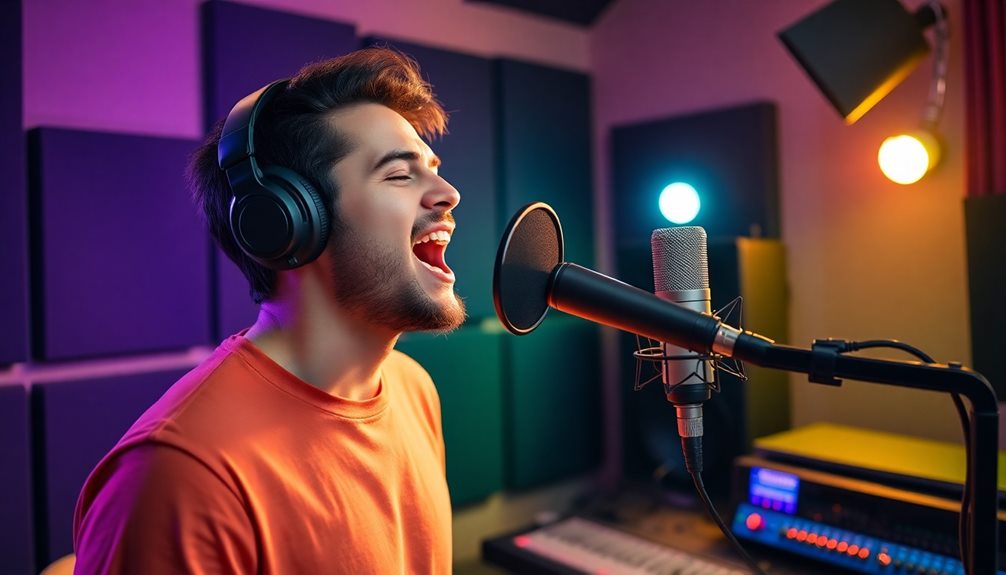
Cardioid microphones are fantastic for solo vocal performances and podcasting!
They pick up your voice clearly while blocking out unwanted noise, which makes your recordings sound professional.
Whether you're singing your heart out or sharing stories, these mics help you shine!
Solo Vocal Performances
Why settle for anything less than pristine sound when performing solo? Cardioid microphones are your best friend for solo vocal performances. They capture your voice beautifully while keeping pesky background noise at bay. This means your audience hears every note and word clearly, making your performance unforgettable.
Additionally, using high-quality equipment is essential for achieving the best sound recording results, as highlighted in the sound recording techniques.
Here are some reasons why cardioid mics shine in solo settings:
- Vocal Clarity: They enhance the subtle nuances of your voice, allowing you to express emotions effortlessly.
- Rich Vocal Reproduction: Models like the Shure SM7B give you a warm sound that makes your voice come alive.
- Low Self-Noise: The Rode NT1-A is famous for its low self-noise, ensuring your performance is captured in stunning detail.
- Handling Loud Sounds: With a sound pressure level of up to 180dB, cardioid mics can handle even the loudest vocal performances without distortion.
In a studio environment, these microphones create a perfect space for your talent to shine.
Podcasting and Broadcasting
In the world of podcasting and broadcasting, choosing the right microphone can make all the difference—especially when it comes to capturing clear, engaging audio. Cardioid microphones are fantastic for this! They isolate your voice and minimize background noise, guaranteeing high audio quality.
Here's a quick comparison of two popular choices:
| Microphone | Key Features |
|---|---|
| Shure SM7B | Great feedback rejection, perfect for noisy environments |
| Audio-Technica AT2020 | Wide frequency response (20Hz to 20kHz) for rich vocal recording |
The Shure SM7B is a favorite among podcasters. Its cardioid polar pattern effectively blocks sound from behind, making it ideal for less-than-perfect recording spaces. On the other hand, the Audio-Technica AT2020 captures the full range of vocal tones, keeping listeners engaged.
With their sensitivity to sounds in front, cardioid mics guarantee your voice is clear and articulate. Plus, their feedback rejection makes them perfect for live broadcasting. So whether you're recording your podcast or hosting a radio show, a cardioid microphone can elevate your audio game!
Recommended Cardioid Microphones
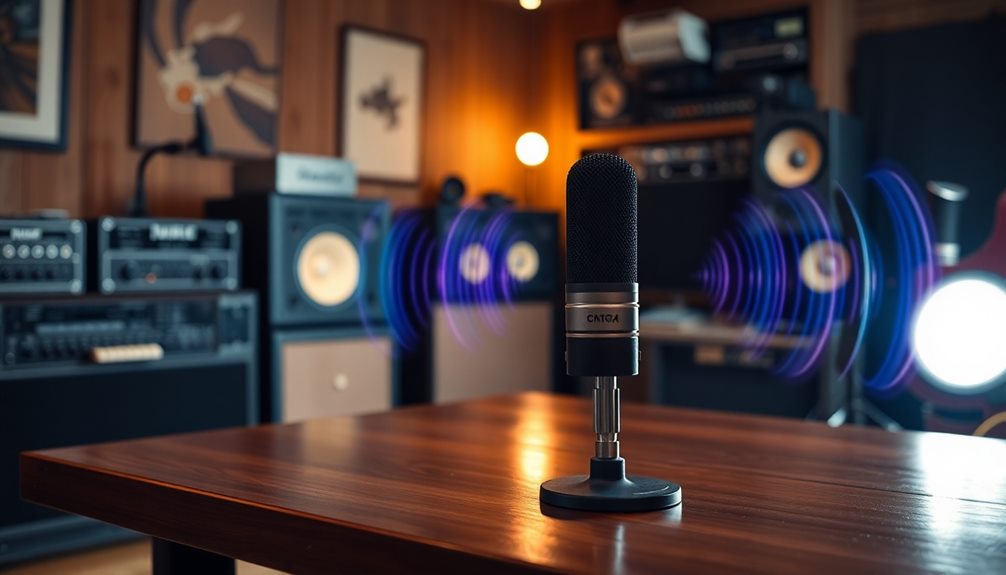
When choosing a cardioid microphone for vocal recording, you'll find a range of options that cater to different needs and budgets. It's exciting to explore the best microphones out there!
Here are some recommended cardioid microphones that deliver great sound quality and clarity without breaking the bank.
- Shure SM7B: A professional choice, known for its rich, warm sound and low noise. Perfect for serious recording at around $400.
- Audio-Technica AT2020: This cardioid condenser is budget-friendly at about $99, making it ideal for home studio beginners.
- Rode NT1-A: Renowned for its clarity and low self-noise, priced around $199. It even includes essential accessories!
- AKG Pro Audio C214: A reliable option for both studio and stage settings, ensuring you sound great in any acoustics.
These microphones not only meet your recording needs, but they also help you achieve professional results.
Whether you're singing, podcasting, or just recording your voice, these studio mics will make your vocals shine.
Comparing Cardioid and Omnidirectional Mics
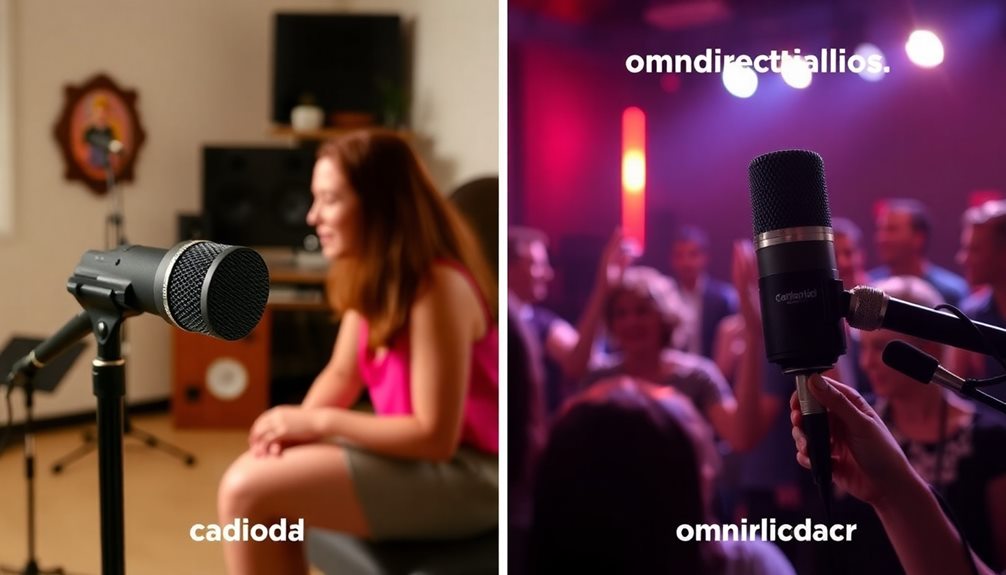
Choosing the right microphone for your recording needs can considerably impact the final sound quality. When comparing cardioid microphones and omnidirectional mics, you'll notice some big differences! Cardioid mics have a heart-shaped polar pattern, capturing sound mainly from the front. This makes them perfect for vocal recording because they reduce background noise. On the other hand, omnidirectional mics pick up sound from all directions, which can introduce unwanted ambient sound.
Here's a quick comparison:
| Feature | Cardioid Microphones | Omnidirectional Mics |
|---|---|---|
| Polar Pattern | Heart-shaped | All-around |
| Sound Isolation | Excellent for vocals | Less effective |
| Best Use | Live performances | Group recordings |
Cardioid mics excel in feedback rejection, making them great for loud environments. They provide clear vocal reproduction and capture nuanced vocal details. In contrast, omnidirectional mics may lack the clarity you need for solo performances. If you want to achieve the best sound, cardioid microphones are the way to go!
Common Issues With Cardioid Microphones
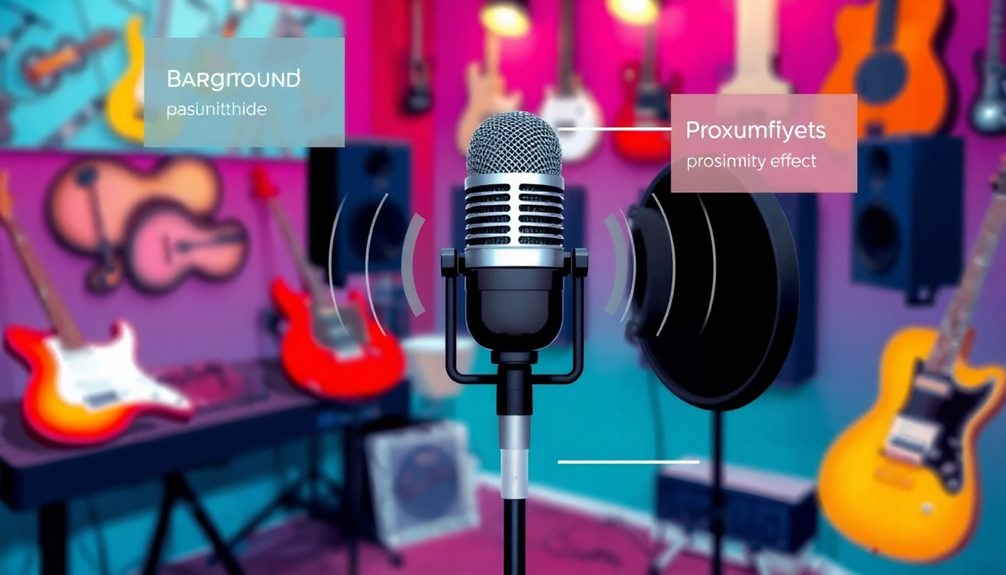
Cardioid microphones are fantastic for vocal recording, but they come with some common challenges that users should be aware of. Knowing these can help you get the best sound possible!
- Proximity effect: When you get too close, it can boost low frequencies, making your voice sound muddy.
- Background noise: If not placed correctly, it can pick up unwanted sounds, so proper placement is key.
- Untreated rooms: Using these mics in spaces without soundproofing can create echoes that muddy your recordings.
- Cable interference: Poor-quality cables can introduce unwanted noise, so always use high-quality cables.
To keep your recordings clear, consider using a pop filter or a windscreen to block wind and plosive sounds. This helps maintain vocal clarity!
Remember, experimenting with your mic's position can greatly improve your results. If you're in a noisy space, try to find a quieter spot or use soundproofing techniques.
Tips for Selecting the Right Microphone

Selecting the right microphone can make a significant difference in your vocal recordings. When you're choosing a cardioid microphone, pay attention to its polar pattern. This feature helps isolate your voice while cutting down on background noise, ensuring you get that clear sound you want.
Next, check the frequency response. Aim for a range of 20Hz to 20kHz, as this captures all the important sounds of the human voice. You want every note and nuance to shine through!
Also, consider the microphone's sensitivity and maximum SPL. For instance, the Rode NT1-A can handle up to 137dB, making it perfect for loud vocal performances without losing clarity.
Don't forget about build quality! A sturdy metal design is essential, especially for live settings where gear gets moved around a lot.
Finally, think about versatility. You want a microphone that works well in both studio and live settings. This way, you can maximize your investment and keep your recordings sounding great, no matter where you are.
Happy mic hunting!
Frequently Asked Questions
Is a Cardioid Microphone Good for Vocals?
Yes, a cardioid microphone's design effectively captures vocals while minimizing background noise. You'll appreciate its ability to isolate your voice, providing clarity and detail, making it an excellent choice for both recording and live performances.
What Type of Microphone Is Best for Recording Vocals?
When recording vocals, you want clarity, yet you also need to minimize background noise. A dynamic or condenser microphone can excel here, but cardioid microphones stand out for their ability to isolate your voice effectively.
What Are the Disadvantages of Cardioid Microphones?
Cardioid microphones have disadvantages like capturing less ambient sound, being prone to handling noise, and struggling with off-axis audio. They can also amplify unwanted noise in live settings and may require pop filters for clarity.
What Is the Best Mic Pattern for Vocals?
When choosing the best mic pattern for vocals, you'll find that cardioid is often ideal. It focuses on sound from the front, reducing background noise and providing clear, warm recordings perfect for performances and studio work.
Conclusion
In the world of vocal recording, a cardioid microphone is like having a superhero by your side! It captures your voice beautifully while keeping unwanted sounds away. Whether you're singing your heart out or recording a podcast, choosing the right mic can make all the difference. So, get excited about your sound! With the tips and info shared here, you're ready to find the perfect cardioid mic that'll help your voice shine like a star!
